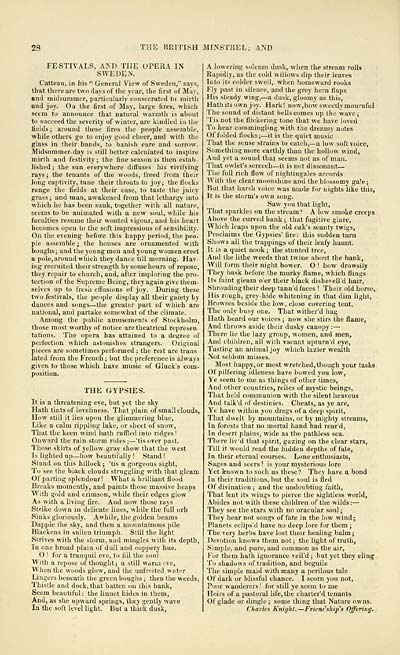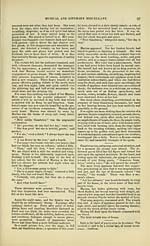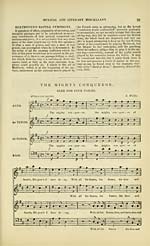Glen Collection of printed music > Printed music > British minstrel, and musical and literary miscellany
(366) Page 28
Download files
Complete book:
Individual page:
Thumbnail gallery: Grid view | List view

28
THE BRITISH MINSTREL; AND
FESTIVALS, AND THE OPERA IN
SWEDEN.
Catteau, in his " General View of Sweden," says,
that there are two rlavs of tlie year, the first of May,
and midsummer, particularly consecrated to mirth
and joy. On the first of May, large fires, which
seem to announce that natural warmth is about
to succeed the severity of winter, are kindled in the
fields; around these fires the people assemble,
while others go to enjoy good cheer, and with the
glass in their hands, to banish care and sorrow.
Midsummer.day is still better calculated to inspire
mirth and festivity ; the fine season is then estab-
lished ; the sun everywhere diffuses his vivifying
rays ; the tenants of the woods, freed from their
long captivity, tune their throats to joy; the flocks
range the fields at their ease, to taste the juicy
grass ; and man, awakened from that lethargy into
which he has been sunk, together with all nature,
seems to be animated with a new soul, while his
faculties resume their wonted vigour, and his heart
becomes open to the soft impressions of sensibility.
On the evening before this happy period, the peo-
ple assemble ; the houses are ornamented with
boughs; and the young men and young women erect
a pole, around which they dance till morning. Hav-
ing recruited their strength by some hours of repose,
they repair to church, and, after imploring the pro-
tection of the Supreme Being, they again give them-
selves up to fresii effusions of joy. During these
two festivals, the people display all their gaiety by
dances and songs — the greater part of which are
national, and partake somewhat of the climate.
Among the public amusements of Stockholm,
those most worthy of notice are theatrical represen-
tations. The opera has attained to a degree of
perfection which astonishes strangers. Original
pieces are sometimes performed ; the rest are trans
lated from the French ; but the preference is always
given to those which have music of Gluck's com-
position.
THE GYPSIES.
It is a threatening eve, but yet the sky
Hath tints of loveliness. That plain of small clouds.
How still it lies upon the glimmering blue,
Like a calm rippling lake, or sheet of snow.
That the keen wind hath ruflled into ridges !
Onward the rainstorm rides ; — 'tis over past.
Those skirts of yellow, gray show that the west
Is lighted up — how beautifully ! Stand !
Stand on this hillock ; 'tis a gorgeous sight.
To see the biack clouds struggling with that gleam
Of parting splendour! What a brilliant flood
Breaks momently, and paints those massive heaps
With gold and crimson, while their edges glow '
As with a living fire. And now those rays
Strike down in delicate lines, while the full orb
Sinks gloriously. Awhile, the golden beams
Dapple the sky, and then a mountainous pile
Blackens in sullen triumph. Still the light
Strives with the storm, and mingles with its depth,
In one broad plain of dull and coppery hue.
O ! for a tranquil eve, to fill the soul
With a rejjose of thought; a still warm eve.
When the woods glow, and the unfretted wster
Lingers beneath the green boughs ; then the weeds.
Thistle and dock, that batten on this bank.
Seem beautiful: the linnet hides in them,
And, as she upward springs, they gently wave
In the soft level light. But a thick dusk,
A lowering solemn dnsk, when the stream rolls
Rapidly, as the cold willows dip their leaves
Into its colder swell, when homeward rooks
Fly past in silence, and the grey hern flaps
His steady wing, — a dusk, gloomy as this.
Hath its own joy. Hark! now,how sweetly mournful
The sound of distant bells comes up the wave ;
'Tis not the flickering tone that we have loved
To hear commingling with the dreamy notes
Of folded flocks; — it is the quiet music
That the sense strains to catch,— a low soft voice.
Something more earthly than the hollow wind,
And yet a sound that seems not as of man.
That owlet's screech — it is not dissonant —
Tlie full rich flow of nightingales accords
With the clear moonshine and the bhissomy ga!e;
But that harsh voice was made for nights like this,
It is the storm's own song.
Saw you that light.
That sparkles on the stream? A low smoke creeps
Above the curved bank ; that fugitive glare.
Which leaps upon the old oak's scanty twigs,
Proclaims the Gypsies' fire: this sudden turn
Shows all the trappings of their leafy haunt.
It is a quiet nook ; the stunted tree,
And the lithe weeds that twine about the bank,
Will form their night bower. O ! how drowsily
They bask before the murky flame, which flings
Its faint gleam o'er their black dishevell'd hair.
Shrouding their deep tann'd faces I Their old horse,
His rough, grey-hide whitening in that dim light.
Browses beside the low, close covering tent.
The only busy one. That wither'd hag
Hath heard our voices ; now she stirs the flame.
And throws aside their dusky canopy : —
There lie the lazy group, women, and men,
And children, all with vacant upturn'd eye.
Tasting an animal joy which lazier wealth
Not seldom misses.
Most happy, or most wretched, though your tasks
Of pilfering idleness have bowed you low,
Ye seem to me as things of other times,
And other countries, relics of mystic beings.
That held communion with the silent heavens
And talk'd of destinies. Cheats, as ye are,
Ye have within you dregs of a deep spirit.
That dwelt by mountains, or by mighty streams.
In forests that no mortal hand had rear'd,
In desert plains, wide as the pathless sea.
There liv'd that spirit, gazing on the clear stars.
Till it would read the hidden depths of fate.
In their eternal courses. Lone enthusiasts.
Sages and seers ! is your mysterious lore
Yet known to such as these? They have a bond
In their traditions, but the soul is fled
Of divination ; and the undoubting faith.
That lent its wings to pierce the sightless world,
Abides not with these children of the wilds: —
They see the stars with no oracular soul ;
They hear not songs of fate in the low wind;
Planets eclips'd have no deep lore for them ;
The very herbs have lost their healing balm;
Devotion knows them not ; the light of truth,
Simple, and pure, and common as the air.
For them hath ignorance veil'd ; but yet they cling
To shadows of tradition, and beguile
The simple maid with many a perilous tale
Of dark or blissful chance. I scorn you not.
Poor wanderers ! for still ye seem to me
Heirs of a pastoral life, the charter'd tenants
Of glade or dingle ; some thing that Nature owns.
Charles Kniijht. — Frien<'ship's Offering.
THE BRITISH MINSTREL; AND
FESTIVALS, AND THE OPERA IN
SWEDEN.
Catteau, in his " General View of Sweden," says,
that there are two rlavs of tlie year, the first of May,
and midsummer, particularly consecrated to mirth
and joy. On the first of May, large fires, which
seem to announce that natural warmth is about
to succeed the severity of winter, are kindled in the
fields; around these fires the people assemble,
while others go to enjoy good cheer, and with the
glass in their hands, to banish care and sorrow.
Midsummer.day is still better calculated to inspire
mirth and festivity ; the fine season is then estab-
lished ; the sun everywhere diffuses his vivifying
rays ; the tenants of the woods, freed from their
long captivity, tune their throats to joy; the flocks
range the fields at their ease, to taste the juicy
grass ; and man, awakened from that lethargy into
which he has been sunk, together with all nature,
seems to be animated with a new soul, while his
faculties resume their wonted vigour, and his heart
becomes open to the soft impressions of sensibility.
On the evening before this happy period, the peo-
ple assemble ; the houses are ornamented with
boughs; and the young men and young women erect
a pole, around which they dance till morning. Hav-
ing recruited their strength by some hours of repose,
they repair to church, and, after imploring the pro-
tection of the Supreme Being, they again give them-
selves up to fresii effusions of joy. During these
two festivals, the people display all their gaiety by
dances and songs — the greater part of which are
national, and partake somewhat of the climate.
Among the public amusements of Stockholm,
those most worthy of notice are theatrical represen-
tations. The opera has attained to a degree of
perfection which astonishes strangers. Original
pieces are sometimes performed ; the rest are trans
lated from the French ; but the preference is always
given to those which have music of Gluck's com-
position.
THE GYPSIES.
It is a threatening eve, but yet the sky
Hath tints of loveliness. That plain of small clouds.
How still it lies upon the glimmering blue,
Like a calm rippling lake, or sheet of snow.
That the keen wind hath ruflled into ridges !
Onward the rainstorm rides ; — 'tis over past.
Those skirts of yellow, gray show that the west
Is lighted up — how beautifully ! Stand !
Stand on this hillock ; 'tis a gorgeous sight.
To see the biack clouds struggling with that gleam
Of parting splendour! What a brilliant flood
Breaks momently, and paints those massive heaps
With gold and crimson, while their edges glow '
As with a living fire. And now those rays
Strike down in delicate lines, while the full orb
Sinks gloriously. Awhile, the golden beams
Dapple the sky, and then a mountainous pile
Blackens in sullen triumph. Still the light
Strives with the storm, and mingles with its depth,
In one broad plain of dull and coppery hue.
O ! for a tranquil eve, to fill the soul
With a rejjose of thought; a still warm eve.
When the woods glow, and the unfretted wster
Lingers beneath the green boughs ; then the weeds.
Thistle and dock, that batten on this bank.
Seem beautiful: the linnet hides in them,
And, as she upward springs, they gently wave
In the soft level light. But a thick dusk,
A lowering solemn dnsk, when the stream rolls
Rapidly, as the cold willows dip their leaves
Into its colder swell, when homeward rooks
Fly past in silence, and the grey hern flaps
His steady wing, — a dusk, gloomy as this.
Hath its own joy. Hark! now,how sweetly mournful
The sound of distant bells comes up the wave ;
'Tis not the flickering tone that we have loved
To hear commingling with the dreamy notes
Of folded flocks; — it is the quiet music
That the sense strains to catch,— a low soft voice.
Something more earthly than the hollow wind,
And yet a sound that seems not as of man.
That owlet's screech — it is not dissonant —
Tlie full rich flow of nightingales accords
With the clear moonshine and the bhissomy ga!e;
But that harsh voice was made for nights like this,
It is the storm's own song.
Saw you that light.
That sparkles on the stream? A low smoke creeps
Above the curved bank ; that fugitive glare.
Which leaps upon the old oak's scanty twigs,
Proclaims the Gypsies' fire: this sudden turn
Shows all the trappings of their leafy haunt.
It is a quiet nook ; the stunted tree,
And the lithe weeds that twine about the bank,
Will form their night bower. O ! how drowsily
They bask before the murky flame, which flings
Its faint gleam o'er their black dishevell'd hair.
Shrouding their deep tann'd faces I Their old horse,
His rough, grey-hide whitening in that dim light.
Browses beside the low, close covering tent.
The only busy one. That wither'd hag
Hath heard our voices ; now she stirs the flame.
And throws aside their dusky canopy : —
There lie the lazy group, women, and men,
And children, all with vacant upturn'd eye.
Tasting an animal joy which lazier wealth
Not seldom misses.
Most happy, or most wretched, though your tasks
Of pilfering idleness have bowed you low,
Ye seem to me as things of other times,
And other countries, relics of mystic beings.
That held communion with the silent heavens
And talk'd of destinies. Cheats, as ye are,
Ye have within you dregs of a deep spirit.
That dwelt by mountains, or by mighty streams.
In forests that no mortal hand had rear'd,
In desert plains, wide as the pathless sea.
There liv'd that spirit, gazing on the clear stars.
Till it would read the hidden depths of fate.
In their eternal courses. Lone enthusiasts.
Sages and seers ! is your mysterious lore
Yet known to such as these? They have a bond
In their traditions, but the soul is fled
Of divination ; and the undoubting faith.
That lent its wings to pierce the sightless world,
Abides not with these children of the wilds: —
They see the stars with no oracular soul ;
They hear not songs of fate in the low wind;
Planets eclips'd have no deep lore for them ;
The very herbs have lost their healing balm;
Devotion knows them not ; the light of truth,
Simple, and pure, and common as the air.
For them hath ignorance veil'd ; but yet they cling
To shadows of tradition, and beguile
The simple maid with many a perilous tale
Of dark or blissful chance. I scorn you not.
Poor wanderers ! for still ye seem to me
Heirs of a pastoral life, the charter'd tenants
Of glade or dingle ; some thing that Nature owns.
Charles Kniijht. — Frien<'ship's Offering.
Set display mode to: Large image | Transcription
Images and transcriptions on this page, including medium image downloads, may be used under the Creative Commons Attribution 4.0 International Licence unless otherwise stated. ![]()
| Special collections of printed music > Glen Collection of printed music > Printed music > British minstrel, and musical and literary miscellany > (366) Page 28 |
|---|
| Permanent URL | https://digital.nls.uk/91439337 |
|---|
| Description | Scottish songs and music of the 18th and early 19th centuries, including music for the Highland bagpipe. These are selected items from the collection of John Glen (1833 to 1904). Also includes a few manuscripts, some treatises, and other books on the subject. |
|---|
| Description | The Glen Collection and the Inglis Collection represent mainly 18th and 19th century Scottish music, including Scottish songs. The collections of Berlioz and Verdi collected by bibliographer Cecil Hopkinson contain contemporary and later editions of the works of the two composers Berlioz and Verdi. |
|---|

